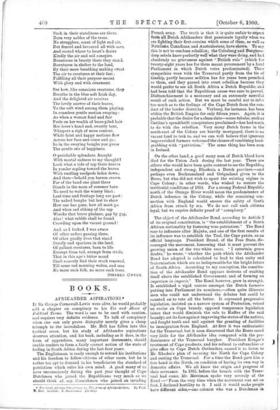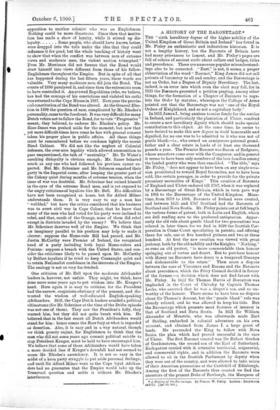BOOKS.
AFRIK ANDER ASP]:RATIONS.*
IF Sir George Cornewall-Lewis were alive, he would probably add a chapter on conspiracy to his Use and Abuse of Political Terms. The word is one to be used with caution, and requires very definite evidence. To talk of conspiracy when one can only prove disloyalty merely gives a cheap triumph to the incredulous. Mr. Bell has fallen into this tactical error, but his study of Afrikander aspirations deserves attention, and his book, including as it does, in the form of appendices, many important documents, should enable readers to form a fairly correct notion of the state of feeling in South Africa during the last four years.
The Englishman is ready enough to extend his institutions and his freedom to fellow-citizens of other races, but he is rather too apt to demand in his beneficiaries the standard of patriotism which rules his own mind. A good many of us have unconsciously during the past year thought of Cape Dutchmen who joined the Republicans very much as we should think of. say, Cornishmen who joined an invading • Tht South Africa?' runeptrocy: or. The Alms of AfrIkanderaom. By Fred.
W. Ben. Loam Ueis.geuLa. L34. new
French army. The truth is that it is quite unfair to expect from all Dutch Afrikanders that passionate loyalty when we are fighting their first-cousins which some of thexn, as well as Natalians, Canadians; and Australaaians, have shown. To say this is not to condone rebellion; the Colesberg and Burghers- dorp rebels knew perfectly well what they were doing, and had absolutely no grievances against "British rule" (which for twenty-eight years has for them meant government by a local Parliament in which Dutch votes predominated). Their sympathies were with the Transvaal partly from thefl tie of kinship, partly because sedition has for years been preached to them, and they passed into overt rebellion because they would prefer to see all South Africa a- Dutch Republic, and had been told that the Republican cause was sure to prevail. Disfranchisement is a necessary and an extremely merciful result of such action. But we must be careful not to infer too much as to the feelings of the Cape Dutch from the con- duct of the border districts. Vryburg„ for instance, has been within the British Empire for only fifteen years. Again, it is probable that the desire for a clean slate—novae tabuke, such as Catiline's spendthrift conspirators proclaimed—has had much to do with the rebellion. Very many Dutch farms in the • north-east of the Colony are heavily mortgaged, there is no vacant land to trek to, and we can well believe that ignorant impoverished farmers welcomed the chance of combining land. grabbingwith " patriotism." The same thing has been seen in Ireland.
On the other hand, a good many men of Dutch blood have died for the Union Jack during the last year. There are others who would have been quite content to see the Republica independent and strong, Rhodesia a Dutch province,—and perhaps even Bechuanaland and Griqualand given to the Boers, but who did not wish to upset the existing regime in Cape Colony; in other words, who wished to restore the territorial conditions of 1854. For a strong Federal Republic north of the Orange River would mean the predominance of Dutch influence in the Colony, while the remaining con- nection with England would ensure the safety of South Africa from attack by sea. We do not call such citizens loyal, but we require definite proof of "conspiracy."
The object of the Afrikander Bond, according to Article 2 of its original constitution, is "the establishment of a South African nationality by fostering true patriotism." The Bond rose to influence after Majuba, and one of the first results of its influence was to establish the Taal, the Cape patois, as an official language. President Brand, of the Free State, dis- couraged the movement, foreseeing that it must prevent the growing union of the two white races. "I entertain grave doubts," he wrote, "whether the path which the Afrikander Bond has adopted is calculated to lead to that unity and fraternisation which are so indispensable for the bright future of South Africa. According to my conception, the constitu- tion of the Afrikander Bond appears desirous of exalting itself above the established Government, and of forming an imperium in imperio." The Bond, however, grew in strength. It established a rigid caucus amongst the Dutch farmers, putting into Parliament its nominees,—often quite illiterate men who could not understand the debates but could be counted on to vote all the better. It repressed progressive legislation, insisted on a narrow system of Protection, vetoed an excise on Cape brandy, opposed temperance legislation (since that would diminish the sale to Kaffirs of the said brandy), set its face against improving the status of the natives, and fought tooth and nail against the granting of _facilities to immigration from England. At first it was enthusiastic for the Transvaal, but it soon discovered that the Boers cared very little for the Afrikander idea compared with the pre- dominance of the Transvaal burgher. President Kruger's treatment of Cape products, and his refusal to enfranchise or give office to Cape Dutch outlanders, caused it to listen to Mr. Rhodes's plan of securing the North for Cape Colony and ousting the Transvaal. For a time the Bond gave him a free hand in the North, on condition of having its own way in domestic affairs. We all know the origin and progress of their severance. In 1885, before the breach with the Trans- vaal had come, Mr. Merriman spoke very severely of the Bond :—"From the very time when the movement was set on foot, I declared hostility to it. I said it would make people have different sides,—one colonist who was a Dutchman in opposition - to another colonist who was an Englishman. Nothing could be more disastrous: Since then that institu- tion has made a show- of loyalty, while it stirred up die. loyalty... . . . Some-people, who should have known better, were dragged into the toils tinder the idea that they could - influence it for gbod, but the. whole teaching of history went to show tloat_when.the conflict was between men of extreme views and. moderate 'men,1 the violent 'section triumphed." Even Mr. Meraiman did not foresee that the Bond would draw -hiraself into views: different from those of- his fellow- Englishmen throughout the. Empire. But in spite of all that has happened during the last fifteen years; these words are valuable. Very many moderate men did join the Bond. The events of 1896_paralysedit, and since then the extremists-Seem to have controlled it. AnavOwed Republican (who, we believe, has had the courage of his convictions and violated his oath) was returned to the Cape Hbuse in 1897. Next year the provin- cial constitution of the Bend was altered. At the General Elec- tion in 1898-the question of race, complicatedly Mr. Rhodes's personality, came to the forefront. It was very difficult for many Dutch voters not to follow the Bond; for to vote "Progressive" meant,- they believed, to endorse Mr. Rhodes's policy. Mr. Rose-Lines-wan pushed aside for the moment, but now that yet more clifficulttimes have come he has with general consent taken his preper place in public affairs. . All these. things must be remembered: before we condemn lightly the recent Ron& Cabinet.. We au not like the neglect of Colonial defences, the over-nice legality which allowed ammunition to pass unquestioned, the talk of "neutrality." Mr. Te Water's sneaking'disloyalty is obvious enough ; Mr. Sauer behaved much, as any one who had followed his previous career. ex- pecte& . But Mr. Schreiner and Mr. Solomon smashed their party in the-Imperial cause, after keeping the greater part of the Colony quiet during months of extreme tension, when the issue -of war was doubtful. Mr. Schreiner has ruined himself in the eyes of the' extreme Bond men, and is yet exposed to the angry-criticismaof loyalists like ,Mr. BelL His difficulties have- not been. recognised. at, home, but Sir Alfred Milner understands them. It is very easy to say a man has ‘• wobbled," but have the critics considered that his business was to avert civil war in Cape- Colony, that he knew that many of the men who had voted for his party were inclined to rebel, and that, south of the Orange, none of them did rebel except in districts invaded by the" enemy? We believe that Mr. Schreiner deserves well of- the Empire. We think that an imaginary parallel to his . position may help to make it clearer: suppose the Home-rule Bill had passed, and Mr. Justin- McCarthy were Premier of Ireland, the recognised head of a party including both loyal Home-rulers and Fenians : suppose a breach with the United States, and con- sider the criticisms likely to be passed. upon Mr. McCarthy by- Belfast loyalists if he tried to keep- Connaught 'quiet and to retain Nationalist confidence in the interests of the Empire. The analogy is not so very far-fetched.
One_ criticism of ,Mr. Bell upon the moderate Afrikander leaders is, howevernot unfair. They might, we think, have done DrOre some years ago to put wisdom into- Mr. Kruger's head.. • Here again it is easy to criticiser- for the President hadthe narrow, suspicions obstinacy of the peasant, and dis- trusted the wisdom of well-educated English-speaking Afrikanders. Still, the Cape Dutch leaders avoided a political ultimatums (for Mr. Schreiner at the time of the Drifts episode was nob one of there). They saw the President's folly, they warned_ him, but they did not quite break with him. He behaved-that in the last resort all Dutch Afrikanders would stand. for him: hence conies the Boer futy at what is regarded as desertion.. Also, it is easy and in. a way natural, though we think gressly unjust, for Englishmen to think that the men who did net some years ago commit political suicide to stop Prisidenticruger, must be held to have encouraged him. We belevethat some of these- Afrikanders would have taken a more decided. line if Kruger's downfall had not seemed to mean- Mr. Rhodes's ascendency. It' is not so easy in the midst of a keen, party struggle to put aside personal feelings; and luntil Sir Alfred Milner went to the Cape loyal Afrikan- der; had no guarantee that the Empire would take up the Transvaal question and settle it without Mr. Rhodes's interference.



















































 Previous page
Previous page